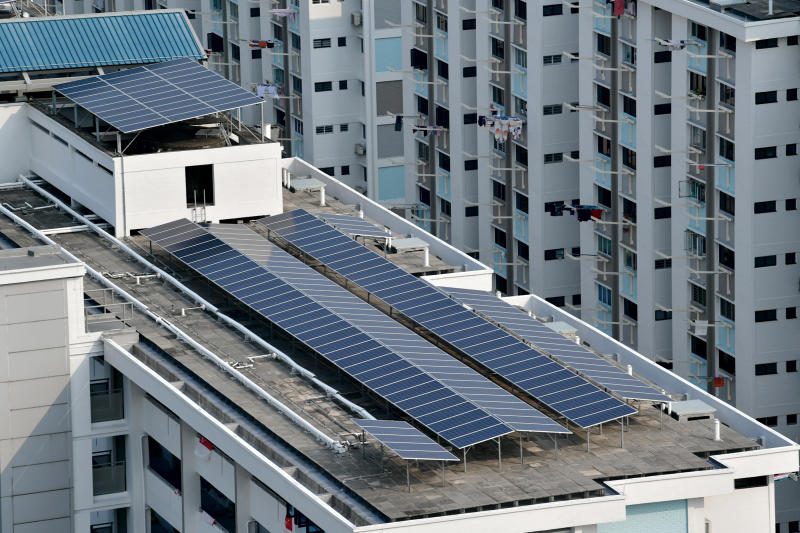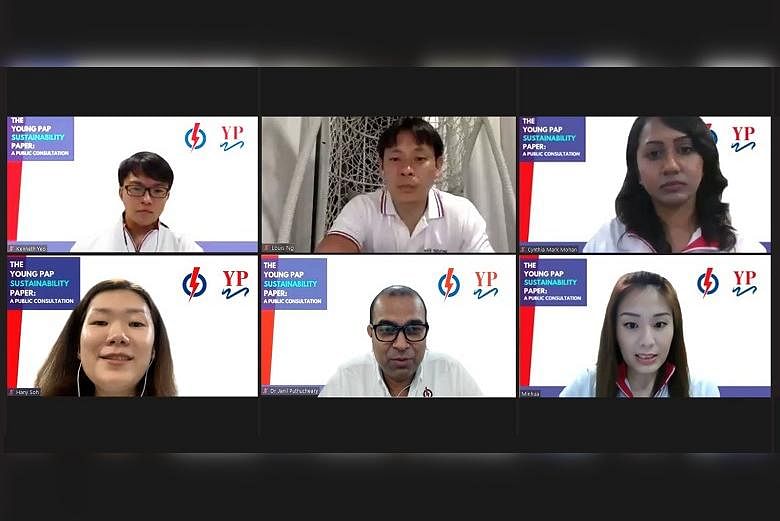PAP youth wing position paper calls for more R&D in alternative energy sources
Sign up now: Get ST's newsletters delivered to your inbox

Singapore must achieve growth both in sustainable practices and economic prosperity to secure a sustainable future.
PHOTO: ST FILE
Follow topic:
SINGAPORE - To ensure Singapore thrives in a future affected by climate change, it should establish itself as a research and development hub for alternative energy sources.
This can be done through building up the talent pool and investing in research infrastructure such as supercomputers.
These were among the new key recommendations in a revised position paper on climate change by the youth wing of the People's Action Party (PAP), Young PAP, released on Sunday (Nov 22).
Since the paper was first made public in March, Young PAP has conducted several rounds of consultations with climate activists, industry experts and members of the public.
The next step is for its content to be discussed in Parliament, said Young PAP chairman Janil Puthucheary, with MPs Louis Ng, Hany Soh and Poh Li San involved in drafting a private member's motion that includes some of the issues. This motion could be raised for debate in February next year.
Dr Janil said: "Even then, that's not the end of it. It's not one speech, one motion, one cut - it's an ongoing process of making these issues part of the agenda of today.
"I think that's the key thing they are committing to as MPs, and they are also committing to representing the Young PAP's voice."
While sustainability has been on the agenda for some time, there are many related topics and it is about which to prioritise, which interventions to put in place, and how to convince people to join the effort, said Dr Janil, who is Senior Minister of State for Health and Communications and Information.
Dr Janil was speaking with reporters after the Young PAP held a public webinar on Sunday to gather feedback on the paper, which he attended, along with Ms Soh, Mr Ng, Young PAP organising secretary Cynthia Mark and member Kenneth Yeo.
Other than devoting resources into alternative energy research, the 19-page paper also said Singapore is well-positioned to lead the carbon documentation and reporting market and provide such services to other countries, with there being no single global standard for carbon accounting.
It should also develop an energy usage data-sharing framework that can reduce compliance costs for businesses.

Chairman of Young PAP Janil Puthucheary, MPs Louis Ng and Hany Soh and Young PAP organising secretary Cynthia Mark took part in a webinar on Nov 22, 2020.
PHOTO: PAP
The paper noted that climate change has affected lifestyles and livelihoods around the world, and Singapore is not immune to its effects, such as rising temperatures, rainfall shortage, and loss of biodiversity.
It said that Singapore must achieve growth both in sustainable practices and economic prosperity to secure a sustainable future.
"For Singapore to contribute meaningfully to climate change negotiations, it must demonstrate that pursuing a sustainable agenda does not necessarily have to come into conflict with economic viability."
Laying out the case for Singapore to be a R&D hub for alternative energy, the paper said that while renewable energy alternatives are available, the energy generation capacity of such energy along cannot meet Singapore's demand, and scalable solutions for carbon-free or efficient sources of energy are needed.
The Government must continue to increase the number of experts researching the science behind scalable alternative energy solutions, said the paper.
In terms of infrastructure, alternative energy researchers can make use of supercomputers to identify scalable solutions, with deeper collaboration between scientists and the National Supercomputing Centre.
During the two-hour webinar, members of the public asked questions ranging from whether there was a focus on preserving biodiversity in the paper, if plant-based diets which can reduce greenhouse gases are being encouraged, and if the paper's suggestions have been incorporated into the PAP's policies.
To the last question, Dr Janil replied during the webinar that the recommendations are still being developed, with the paper still in the consultations phase.
Asked about the value of consulting the public, Dr Janil told reporters that the public consultations process is vital, both for activists to explain their ideas and discuss them with members of the public who might not be familiar with them, and for the activist to learn how such ideas are received by broader segments of the population.
Mr Ng, who chairs the Government Parliamentary Committee for Sustainability and the Environment, said the important thing was to put up a platform for people to share their views, which would help shape policies.
"I think the best ideas are out there, it's up to us to go out there to create a platform to capture some of these ideas, and give them a voice in Parliament."

